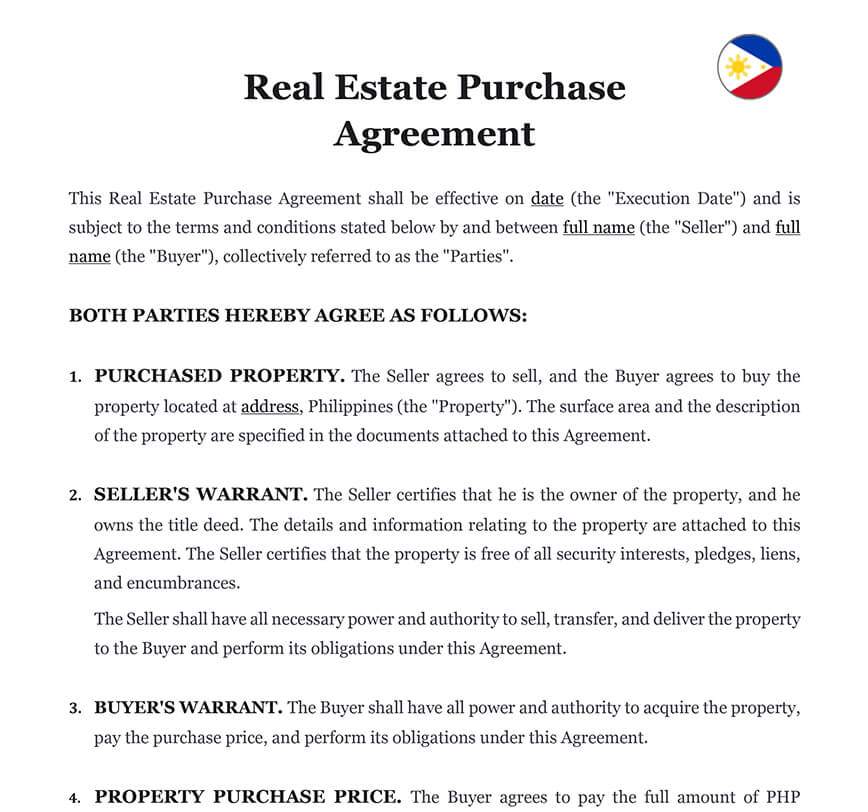Why is a property purchase contract important in the Philippines?
A property purchase contract is of utmost importance when buying a property in the Philippines. It serves as a legally binding agreement between the buyer and seller, outlining the terms and conditions of the transaction. This contract provides clarity and protection for both parties involved in the property purchase. It ensures that the rights, obligations, and expectations of both the buyer and seller are clearly defined and agreed upon. The property purchase contract helps prevent misunderstandings, disputes, or potential legal issues that may arise during or after the transaction. By having a well-drafted and comprehensive property purchase contract, buyers and sellers can proceed with confidence, knowing that their interests are safeguarded.
What are the key elements of a property purchase contract in the Philippines?
A property purchase contract in the Philippines typically includes several key elements:
1. Identification of Parties: The contract should clearly identify the buyer and seller, including their full names, addresses, and contact information.
2. Description of the Property: The contract should provide a detailed description of the property being sold, including its location, boundaries, area, and any pertinent details.
3. Purchase Price and Payment Terms: The contract should state the agreed-upon purchase price and specify the mode and schedule of payment.
4. Conditions and Contingencies: The contract may include any specific conditions or contingencies that must be fulfilled before the sale can proceed, such as obtaining financing or satisfactory property inspections.
5. Transfer of Ownership: The contract should outline the process and timeline for transferring ownership from the seller to the buyer, including any necessary legal steps or documentation.
6. Warranties and Disclosures: The contract may address any warranties or guarantees provided by the seller and require the seller to disclose any known defects or issues with the property.
7. Remedies and Dispute Resolution: The contract may include provisions for dispute resolution, such as arbitration or mediation, and outline the available remedies in case of breach or non-compliance.
8. Signatures and Notarization: The contract must be signed by both parties and notarized to make it legally binding and enforceable.
These elements ensure that all essential aspects of the property purchase are covered and provide a clear understanding of the terms and conditions for both the buyer and seller.
How to draft a legally binding property purchase contract in the Philippines?
Drafting a legally binding property purchase contract involves several important steps. First, it is crucial to seek professional assistance from a lawyer or real estate professional who specializes in property transactions. They can provide valuable guidance and ensure that the contract meets all legal requirements. When drafting the contract, it is essential to include essential terms and conditions that clearly outline the rights, obligations, and responsibilities of both the buyer and seller. These terms should cover crucial details such as the purchase price, payment terms, property description, and any conditions or contingencies. It is also important to be specific and detailed, providing precise information about the property, including boundaries, improvements, and any existing encumbrances or liens. Compliance with legal requirements is another crucial aspect, including obtaining necessary permits, clearances, certifications, and fulfilling tax obligations. To handle potential disputes, it is advisable to incorporate dispute resolution mechanisms such as mediation or arbitration in the contract. Careful review and revision of the draft contract with all parties involved are necessary to ensure accuracy and completeness. Once the contract is finalized, it should be signed in the presence of a notary public to make it legally binding and enforceable. Seeking professional legal advice throughout the process will help ensure that the property purchase contract is properly drafted, protecting the rights and interests of all parties involved.
What are the legal requirements for buying property in the Philippines?
When buying property in the Philippines, there are several legal requirements that buyers must fulfill to ensure a smooth and lawful transaction. These requirements may vary depending on the nature of the property and the location, but some common legal requirements include:
1. Valid Title
Ensure that the property has a valid title and is registered with the appropriate government agency, such as the Register of Deeds. Conduct a thorough title search to verify the ownership and identify any encumbrances or liens on the property.
2. Documentary Stamps and Transfer Taxes
Pay the necessary documentary stamp taxes and transfer taxes as required by law. These taxes are typically based on the property’s selling price or fair market value.
3. Notarization
Execute the necessary legal documents, such as the Deed of Sale or Contract to Sell, in the presence of a notary public. Notarization is important to make the documents legally valid and enforceable.
4. Documentary Requirements
Prepare and submit the required documents, which may include valid identification cards, tax identification numbers, proof of income, and other supporting documents as requested by the seller, government agencies, or financial institutions involved in the transaction.
5. Compliance with Zoning and Land Use Regulations
Ensure that the property is compliant with zoning and land use regulations imposed by the local government. This is especially important for commercial or industrial properties.
6. Payment of Taxes and Fees
Fulfill tax obligations associated with the purchase, such as capital gains tax, value-added tax (VAT), and other applicable taxes. When buying a property you should also be aware of any additional fees, such as registration fees or notarial fees, that may be required.
7. Compliance with Foreign Ownership Restrictions
If the buyer is a foreigner, ensure compliance with the restrictions on foreign ownership of land and properties as stipulated by the Philippine Constitution and relevant laws.
It is advisable to consult with legal professionals, such as real estate lawyers or licensed brokers, to ensure full compliance with all legal requirements when buying property in the Philippines. They can guide buyers through the process and help navigate any complexities or specific legal considerations associated with the transaction.
What are the differences between a property purchase contract and a deed of sale in the Philippines?
A property purchase contract and a deed of sale play distinct roles in real estate transactions in the Philippines. While they both facilitate the transfer of property ownership, there are important differences to consider. A property purchase contract, also known as a “Contract to Sell” or “Agreement to Sell,” is a preliminary agreement that outlines the terms and conditions of the sale. It establishes the obligations of the buyer and seller and precedes the execution of a deed of sale. However, a deed of sale is a final and formal document that signifies the actual transfer of ownership from the seller to the buyer. A property purchase contract creates an equitable interest in the property, giving the buyer the right to purchase but not legal ownership, while a deed of sale transfers legal ownership upon execution. Notarization is required for a deed of sale to be valid, while a property purchase contract may or may not require notarization. The property purchase contract includes payment terms, while the deed of sale typically does not. Additionally, the property purchase contract is executed before the deed of sale, setting the terms of the transaction, while the deed of sale is executed once all conditions are fulfilled to formalize the transfer of legal ownership. It’s crucial to consult legal professionals, such as real estate lawyers or licensed brokers, to ensure proper preparation and execution of both documents in compliance with Philippine laws and regulations
What is the role of a lawyer in creating a property purchase contract in the Philippines?
Engaging the services of a lawyer is highly recommended when undertaking a property purchase in the Philippines. Their expertise includes legal guidance, drafting comprehensive contracts, due diligence, negotiations, legal advice and review, document notarization, and dispute resolution, safeguarding the buyer’s interests throughout the transaction process.











